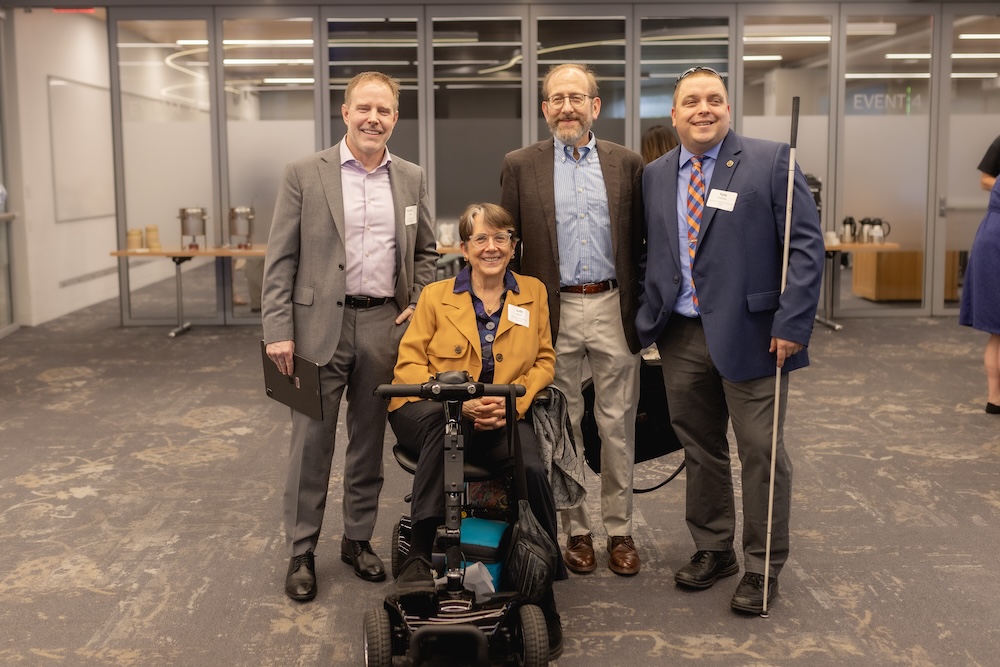HUIT hosts 3rd annual University-wide Accessibility Summit

Michael Tran Duff, keynote speaker Judy Brewer, President Alan Garber, and Kyle Shachmut.
Photo by Laura Shachmut Photography
Harvard University Information Technology’s Digital Accessibility Services hosted the third annual University-wide Accessibility Summit on June 17. The event brought together Harvard faculty and staff for a day of learning and connecting accessibility practitioners to celebrate progress made and highlight work being done to drive disability inclusion across the University. In both the physical and digital worlds, accessibility is key to ensuring the entire Harvard community can access and contribute to the University’s knowledge, ideas, and resources. The Accessibility Summit highlighted the University’s commitment to making information technology and digital content as well as physical spaces accessible to everyone.
In his opening remarks, President Alan Garber summed up the importance of incorporating accessibility into our community and work: “When we make it possible for more people to participate fully in the work of the University, we benefit from more ambition, more creativity, and more talent. When individuals can do their best work, the institution becomes better, and we become better as well.”
The keynote address was delivered by Judy Brewer, an executive fellow at the School of Information and Goldman School of Public Policy at University of California, Berkeley and the former assistant director for accessibility, at the White House’s Office of Science and Technology Policy. Brewer emphasized the growing importance of digital accessibility in universities, highlighting its central role in ensuring that students, faculty, and staff can fully participate in academic life. She also addressed the transformative potential — and risks — of emerging technologies such as artificial intelligence, stressing the need for disability-informed planning and research.
Eight breakout sessions offered a comprehensive look at new tools, strategies, and best practices for advancing digital accessibility across campus. Sessions were hosted or cohosted by experts from DAS, University Disability Resources (UDR), the Assistive Technology Center (ATC), Harvard John A. Paulson School of Engineering and Applied Sciences (SEAS), and Harvard Web Publishing (HWP). Highlights included the introduction of Mobilio, a Harvard-developed smartphone app to help people with disabilities navigate outdoor spaces using real-time computer vision and spatial audio; techniques for creating accessible documents and hosting inclusive events; the accessibility-first design of the new HarvardSites platform; and a new Canvas assessment tool for evaluating the accessibility of course content.
Digital accessibility refers to making sure technology is usable to people with and without disabilities at the same time. This can include things like captions for videos on websites or social media, being able to use a website with only a keyboard, and descriptions for images among other things. The tips apply to websites, social media, documents and technology created in house or purchased from outside providers.
“Events like the Accessibility Summit that bring people together from across the entire University to share best practices and resources are tremendously important” said Kyle Shachmut, senior director of Digital Accessibility Services “because we all have a role to play in making Harvard accessible, and much of what we do for accessibility helps make technology easier to use for everyone.”
Michael Tran Duff, chief information security and data privacy officer, added that “Harvard’s approach of positioning digital accessibility alongside privacy and security ensures that all three of these vital University-wide programs are on equal footing, where the common theme is helping our community members engage readily and safely online.”
The summit complements year-round programming available to the entire Harvard community from HUIT. Digital Accessibility Services offers training, consultation, and resources on accessibility for the Harvard community, and provides support and guidance on Harvard’s Digital Accessibility Policy.




